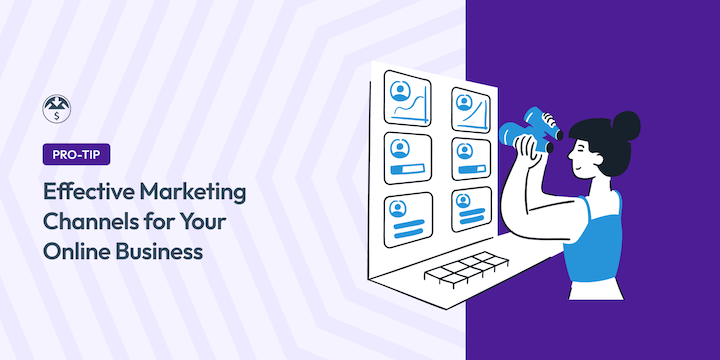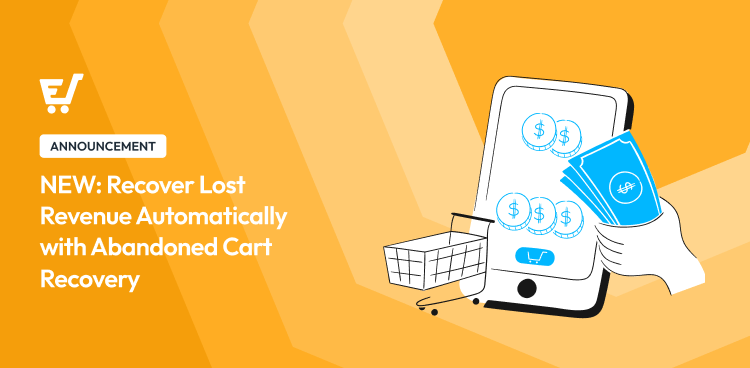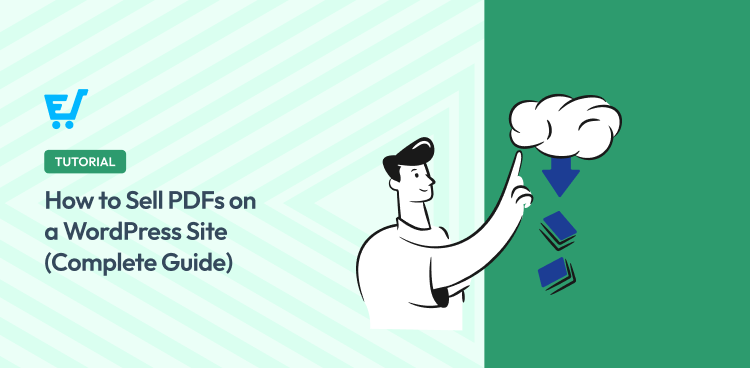Are you leveraging the most effective marketing channels for your online business?
Whether starting a new business or looking to elevate a current eCommerce strategy, marketing is always essential.
But with so many channels to choose from, it can be overwhelming to decide where to focus your efforts.
This comprehensive guide will help point you in the right direction.
🔎 I’ll cover:
Why Market Your Online Business?
If people don’t know about your product or your business, how can you be considered an option? (Spoiler: You can’t.)
Marketing your online business is a way of getting the word out about your offerings and highlighting how they solve a problem.
It’s about generating awareness and helping to position your products in front of the right people, at the right time.
To create the most effective marketing strategy possible, it’s important to invest a lot of time into the research and planning stages.
Understanding Your Audience
Before diving into specific marketing channels, it’s crucial to understand your target audience. Knowing who you’re trying to reach helps you tailor your marketing efforts to resonate with them.
Any existing data you have on your current customers will help you define who your customers are.
First, create buyer personas. Develop detailed profiles of your ideal customers, including their demographics, interests, and pain points.
Then utilize analytics. Use tools like Google Analytics to track website traffic and user behavior. This data can help you identify your target audience’s preferences and habits.
Once you understand your target audience, you can tailor your marketing messages to their specific needs and interests.
The Purpose of Effective Marketing Channels
Marketing channels — sometimes called mediums by advertising agencies — refer to the means or methods used for distributing a message to a specific audience.
The channels you include in your marketing strategy can play a major role in how successful your campaigns are.
Marketing is broad and incorporates many different areas. There is no one-size-fits-all solution.
The best and most effective marketing channels for your business will depend on your target audience, budget, and goals. A multi-channel approach is often the most effective.
Almost all channels and media can be categorized into three groups: Paid, Owned, and Earned.
Paid channels/media are services and placements that have been paid for. You’re in control of the content that goes in the paid spaces, but you don’t own the space.
Owned marketing channels are directly influenced by you. You’re in control of what goes where, and how your business is represented in that space. You own the space (or the account, in some cases). Many internet marketing channels fall under this category.
Earned media is free, but it is not controlled by you. It is given at the sole discretion of others. And it’s the most valuable exposure you can get.
Most Effective Marketing Channels for eCommerce
Ready to jump in?
Let’s look at some of the most effective marketing channels for online businesses.
For each, I’ll include some of the more specific subsets. I’ll also cover key tips and WordPress tools to help you maximize your success in each category.
1. Your Website
The one channel you have the most control over is your website. It’s your business’s home on the internet and where you turn visitors into customers. Your site’s content, design, and performance determine if a visitor stays or goes.
Your website should provide important information about what you do or sell. It should detail the value you offer and the problems your products solve (the benefits).
There are many steps to take when building your eCommerce site and turning it into an effective online marketing channel. It’s crucial to start with a strong foundation.
In the case of eCommerce, that means a reliable hosting provider and feature-rich plugin that lets you easily turn your WordPress site into an online store.
If you sell digital products, the best option is Easy Digital Downloads (EDD).
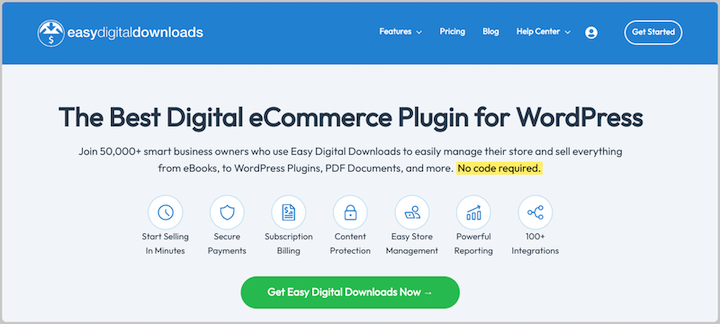
This freemium WordPress plugin lets you create a digital download store within minutes.
You can access marketing and optimization tools, free themes, customer and order management, discount codes, and much more.
Check out these guides to learn more:
2. Search Engine Marketing (SEM/SEO)
Search engines play a pivotal role in marketing for online businesses. They act as gateways for customers to discover products and services.
SEM, or Search Engine Marketing, is a broad term that includes all marketing efforts aimed at increasing website visibility through search engines.
It involves targeting users actively searching for specific products or services. These campaigns can be highly targeted and excellent for reaching users already interested in what a business offers.
SEO, or Search Engine Optimization, is one of the key components of SEM. It focuses on optimizing your website’s content, structure, and technical elements to rank higher in organic search engine results pages (SERPs).
Optimizing for relevant keywords and phrases can increase your chances of appearing higher in search results, leading to increased organic traffic.
Conduct Keyword Research
Start by conducting keyword research start by conducting keyword research to identify your essential terms and phrases.
Tools like Ahrefs, SEMrush, LowFruits, and Google Keyword Planner can help identify relevant keywords for your products or services.

On-Page & Off-Page SEO
Incorporate keywords into your content naturally. For on-page SEO, that means optimizing your website’s product pages, title tags, meta descriptions, and header tags with relevant keywords.
Technical elements that influence SEO include site speed, XML sitemaps, and mobile-friendliness.
Build high-quality backlinks from other reputable websites to improve your domain authority.
AIOSEO is a popular SEO plugin that helps optimize your website’s content.
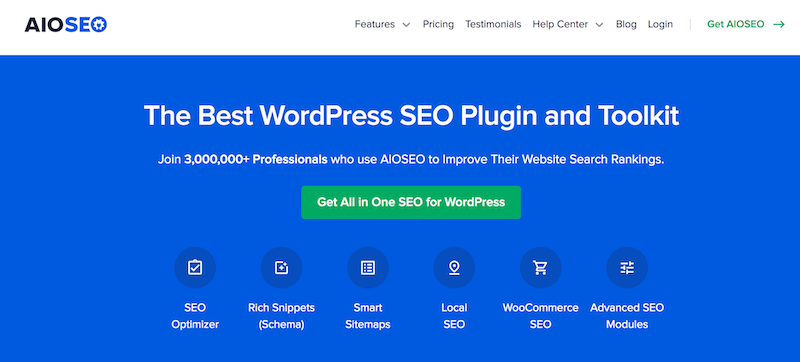
It also has features for XML sitemaps, schema markup, and internal linking.
3. Content Marketing
Content marketing goes a long way in a successful SEO strategy.
Create high-quality content like blog posts that:
- Targets your audience’s Interests
- Answers their questions
- Addresses their pain points
Again, I highly recommend AIOSEO for optimizing your on-site content.
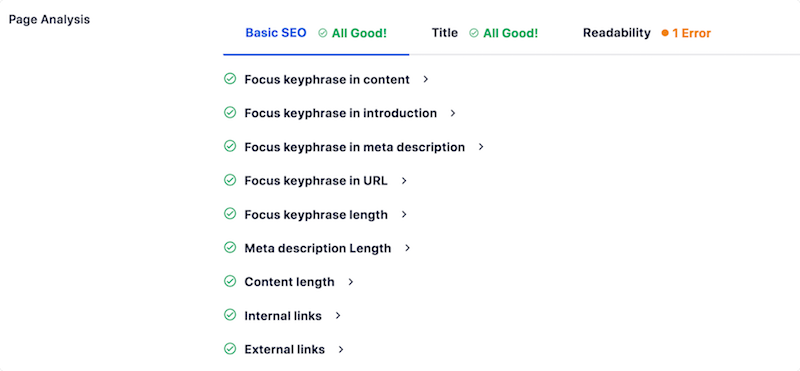
Plan your content to ensure a consistent publishing schedule. Share your content on social media and other channels to increase visibility.
ClickSocial is an excellent plugin that you can use to integrate your WordPress site with social media platforms.
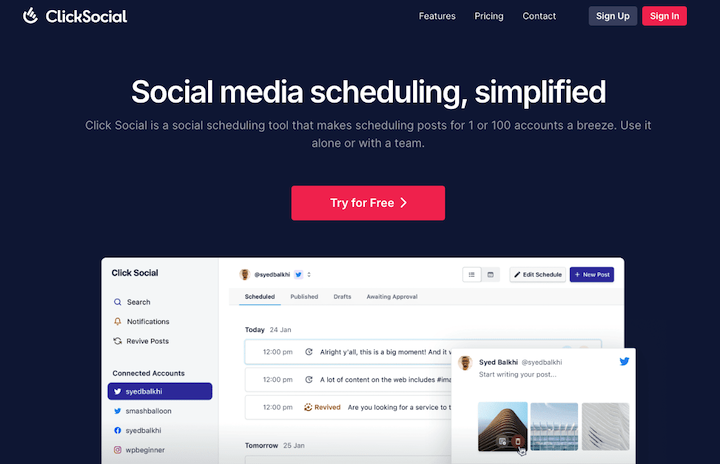
You can use a plugin like MonsterInsights to connect Google Analytics and track metrics like website traffic, engagement, and conversions.
4. Paid Ads & Retargeting
Pay-per-click advertising (PPC ads) lets you bid on keywords and display ads at the top of SERPs and other sites. They appear when certain keywords or phrases are searched for by people:
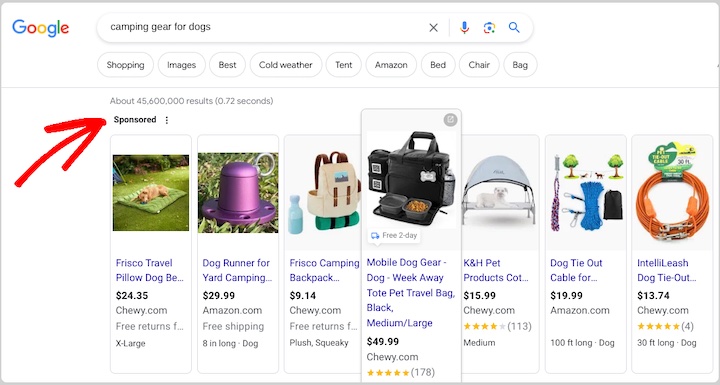
You pay a fee each time your ad is clicked.
Another version of PPC is a strategy called retargeting (or remarketing). This involves showing ads to users who have previously visited your website.
This is typically done by placing a tracking pixel on your website.
When a user visits your site, the pixel collects information about their browsing behavior. The information is then used to target the user with ads on other websites and apps.
These people are likely already interested in your product, as they have already visited your website. A display ad is usually an image, which may have graphic elements and text.
Some tips:
- Consider platforms like Google Ads and Bing Ads to reach your target audience.
- Determine how much you’re willing to spend on PPC advertising and set a daily or monthly budget.
- Create ad copy that is clear, concise, and persuasive. Consider offering a discount code or coupon to increase the chances of converting ‘window shoppers’.
- Use targeting options to reach specific demographics, interests, and behaviors.
- Monitor your PPC campaigns and make adjustments to improve performance. You can connect your website to Google Analytics and Search Console to track performance.
Keep in mind that ad blocker software is a factor if you are looking at investing in retargeting. You can always start small to see how it goes. There is no minimum spend, and you can pause spending at any time.
5. Social Media Marketing
Social media is a powerful tool for building brand awareness, engaging with your audience, and driving traffic to your website.
This type of owned marketing channel allows you to engage and interact with your audience. You can use it as a customer service tool and to promote products and content that drive traffic to your site.
Most social media platforms have excellent audience data and analytics, which you can use to learn more about the interests and behaviors of your followers.
While you can typically get started for free, there are also plenty of paid advertising opportunities to further extend your reach.
Social media tips
Select platforms that align with your target audience’s preferences, such as Instagram, Facebook, Twitter, or LinkedIn.
Share high-quality, engaging content, such as images, videos, and blog posts. You could also run contests and giveaway promotions to encourage user engagement and build your following.
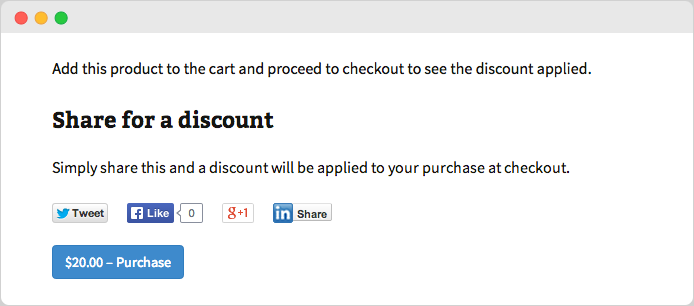
To help ensure you’re consistently posting, I recommend creating a content and social media schedule. You can use a tool like ClickSchedule to manage everything directly within your WordPress admin area.
You can schedule posts, create and optimize your calendar, and so much more.
Be sure to actively monitor social media conversations and respond to comments and messages.
6. Affiliate Marketing
Affiliate marketing involves partnering with other businesses, influencers, publishers, etc. to promote your products or services. Affiliates earn a commission for each sale they generate.
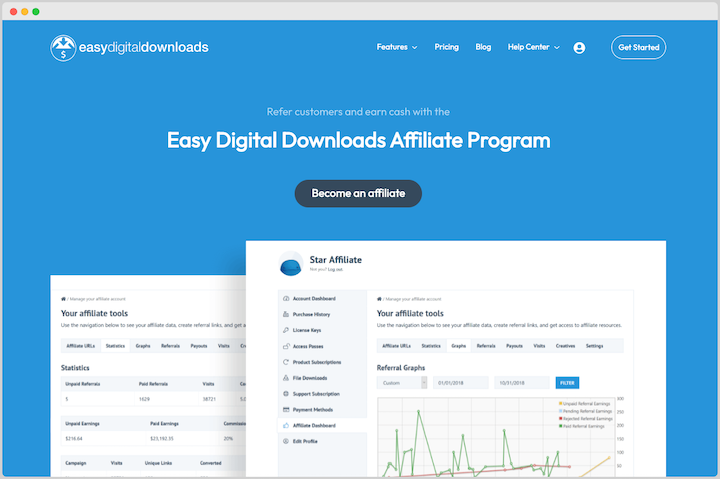
This paid marketing channel brings other people into your business to help you promote it. With some firm terms and conditions in place, it’s low-risk and highly effective.
Spend time researching to determine what type of affiliate marketing solution will work best for you. You can run a self-hosted affiliate program on your website or use a 3rd-party solution.
I highly recommend AffiliateWP.
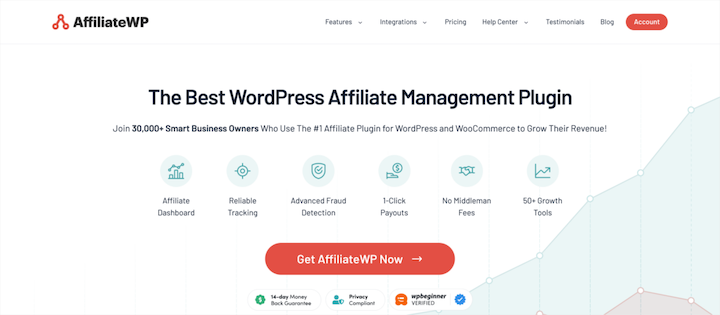
This all-in-one affiliate marketing solution for WordPress lets you create and manage your affiliate program with ease. It also integrates seamlessly with Easy Digital Downloads.
Once you create your program, reach out to potential affiliates and encourage them to promote your products. Review your affiliate applications carefully. Make sure your affiliates are the right fit for your business.
Provide affiliates with marketing materials, such as banners, product descriptions, and email templates.
Then you can track and monitor affiliate sales and commissions.
7. Email Marketing
Email marketing is one of the most popular owned marketing channels. It’s effective for a handful of reasons:
- Email is one of the most widely used methods of communication.
- Almost all email users check their email every single day.
- You control the content included in emails, so tailored messages can be communicated strategically.
- It’s cost-effective and sometimes completely free.
- People on your subscriber list are validated and already expressed an interest in your offerings.
Creating a mailing list of people interested in the products you sell or the services you provide gives you an audience to engage with on an ongoing basis.
Place a newsletter sign-up or opt-in form on your site to collect the email addresses of potential customers.
Then use emails to inform your audience or customers of news, updates, sales, and other content.
In addition to letting you automate your eCommerce emails, Easy Digital Downloads lets you integrate with a wide range of email service providers and solutions. This includes MailChimp, ActiveCampaign, Constant Contact, GetResponse, and more.
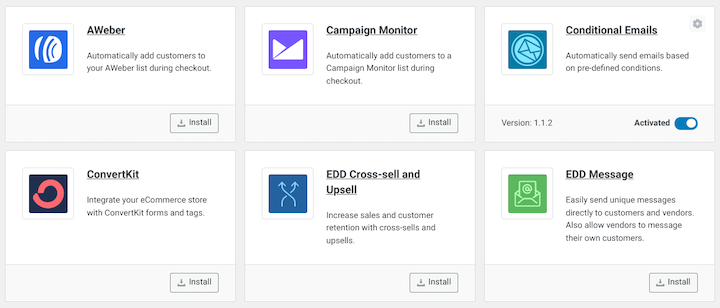
The features they provide will make your email marketing more streamlined and easier to manage. Plus, they provide reporting and data so you can see how your emails are performing.
8. Testimonials & Social Proof
Organic, un-bought marketing, straight from the horse’s mouth, online or offline. Word-of-mouth is the most trusted form of marketing, from one user or customer to another.
In today’s digital age, testimonials and social proof are forms of word-of-mouth marketing.
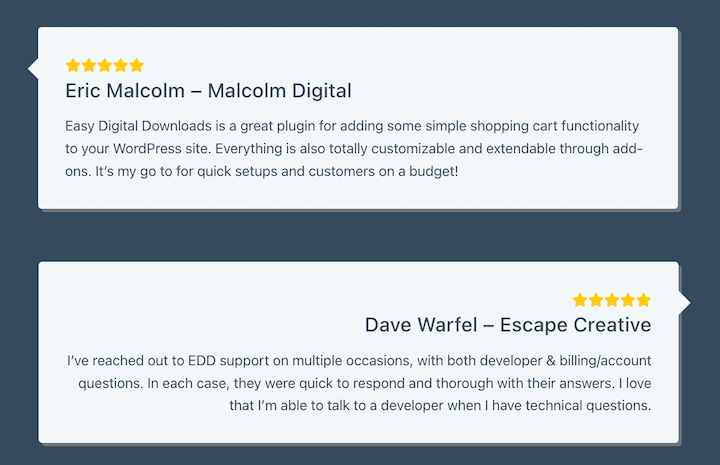
When a customer is over the moon with your product, service, company, or all of the above, they will be more than happy to provide you with a testimonial, organically.
Glowing testimonials should have pride of place on your website – put them on your homepage, product pages, etc.
You can request them in a post-purchase email or add a customer review form on your site. EDD Reviews lets you easily collect and manage them from your WordPress site.
FAQs on Marketing Channels
Let’s wrap up with a few frequently asked questions about choosing and using effective marketing channels.
What are effective marketing channels for small businesses?
The best and most effective marketing channels for your business depend on your target audience and budget. A multi-channel approach is often the most effective.
Social media, email, and content marketing are inexpensive but powerful solutions to start with.
How often should I post on social media?
The optimal posting frequency varies depending on the platform and your target audience.
For instance, what days and times of the week are your ideal customers most active, and on which platforms?
It’s also important to consider the type of social media content your followers want to see from you.
Creating a schedule to optimize posting times is smart. Experiment with different posting schedules to see what works best for you.
How do I measure the success of marketing campaigns?
Track key performance indicators (KPIs) to measure the effectiveness of your campaigns.
Key KPIs to Track:
- Website Traffic: Measure the number of visitors to your website.
- Conversion Rate: Track the percentage of website visitors who make a purchase.
- Customer Acquisition Cost (CAC): Calculate the cost of acquiring a new customer.
- Customer Lifetime Value (CLTV): Determine the total revenue a customer generates over their lifetime.
- Return on Investment (ROI): Measure the profitability of your marketing campaigns.
Create an Effective Marketing Strategy Today
Remember that marketing is a marathon, not a sprint. You don’t have to commit to any one channel forever. Experiment with various strategies and stay consistent in your efforts.
If you don’t already have Easy Digital Downloads, grab a pass today to elevate your eCommerce marketing strategy and take your online business to the next level:
To learn more about effective marketing channels and strategies, check out ways to attract ready-to-buy customers.
📣 P.S. Be sure to subscribe to our newsletter and follow us on Facebook, Twitter/X, or LinkedIn for more WordPress resources!
